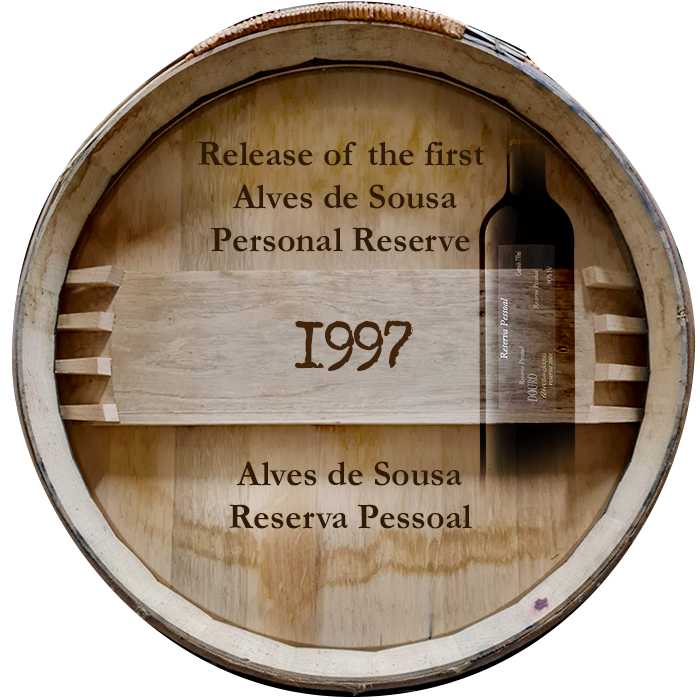THE HISTORY

Wine production is a family tradition for Domingos Alves de Sousa: his father (Edmundo Alves de Sousa) and grandfather (Domingos Alves de Sousa) had already been Douro winemakers. But Domingos initially embraced another career. Having graduated in Civil Engineering, he could not resist the double appeal (of land and blood), and abandoned his activity in 1987 to dedicate himself exclusively to the exploration of the estates that he inherited and others that he later acquired, in which he has been carrying out model land consolidation and restructuring work on the vineyards. The evolution of its winemaking activity has interesting, almost paradigmatic aspects and deserves a little history.
For a long time he was a supplier to the well-known and prestigious companies Casa Ferreirinha and Sociedade dos Vinhos Borges. But the problems that affected the sector in the late 1980s, which resulted in an exaggerated increase in production costs, and in particular the catastrophic 1988 harvest, led him to question the profitability of his farms. This questioning was the turning point. Like many other Douro winegrowers, affected by the recession in which the Demarcated Region was struggling, he turned to valuing the "leftovers" of Port Wine, that is, the Douro pasture wine, until then traditionally subordinated in relation to the generous wine.


Of course, this radical change in attitude required more than simple goodwill and the desire to win: it required technical and professional training. He therefore attended courses in viticulture and oenology and, armed with this support, he set to work restructuring his vineyards and, determined to follow his own path as a producer-bottler, he built the winery in his Quinta da Gaivosa where he would from then on vinify the wine. production from the remaining estates.
After carrying out some experiments with different grape varieties, he selected those that proved to be most capable of producing the best Douro Denomination of Origin wines, and with them he produced and launched on the market, in mid-1992, what would be his first wine: Quinta do Vale da Raposa white 1991, which immediately captivated connoisseurs and deserved the best references.
In 1994, the first Quinta da Gaivosa was launched, but it was the following year's edition, 1995, that will forever go down in history as one of the Douro's most iconic wines. To never betray this legacy, Domingos decided that new Quinta da Gaivosa would only be produced in years of excellence.
From each of the family's remaining farms, different ranges of wines emerged resulting from the grapes produced on them and their particularities and diversity of terroir.
Whites and reds were launched from Quinta da Estação, Quinta das Caldas and, in 2017, Quinta da Oliveirinha, located in one of the most traditional and noble areas of the Douro and with the best production of Port wines, was acquired from family members.


In 2002 Tiago Alves de Sousa officially joined the company, teaming up with Anselmo Mendes, gaining experience and developing his own style in wine production, until the moment he became the exclusive winemaker for this family project.
The iconic Abandonado 2004 was the first wine in which Tiago made himself known as a creator of wines with a unique character and, since then, he has presented us with a series of new concepts, aromas and flavors.
In the recovery of the old family tradition of Port wine production, Amphitheatrum Porto Vintage is, without a doubt, a remarkable wine.
He also made a difference with the premium rosé Rosa Celeste, in homage to his grandmother Maria Celeste, mother of Domingos Alves de Sousa and these are just a few highlights among the countless award-winning wines he has created.
Domingos Alves de Sousa's strategy and success involved resorting to the support of professionals and experts in different areas that he did not master. He has always had the support and collaboration of his family, specializing in different areas. Initially his wife Lucília was responsible for the entire administrative component, later his daughter Patrícia became responsible for financial management and, together with Domingos and Tiago, responsible for the development of different international markets.
João and Andreia Alves de Sousa, brothers of Tiago and Patrícia, have also collaborated for years in the family business, especially in the design and communication component. Andreia has been responsible for developing the image of most of the family's brands, such as Vale da da Raposa, Estação, Caldas e Oliveirinha and João of the iconic Vinha de Lordelo and Abandonado, as well as creating presentation videos and online content.
This is a family business, from generations to generations




TIMELINE














































